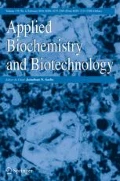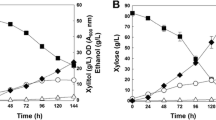Abstract
Xylitol is a valuable substance utilized by food and biochemical industries. NAD(P)H-dependent xylose reductase (XR)—encoded by the yeast KmXYL1 gene—is the key enzyme which facilitates reduction of xylose to xylitol. Multi-copy integration of a mutant KmXYL1 (mKmXYL1) gene was carried out using thermotolerant yeast Kluyveromyces marxianus KCTC17555ΔURA3, in order to enhance xylitol production. After multi-copy integration, the highest xylitol producing strain was isolated and named K. marxianus 17555-JBP2. This strain exhibited 440% higher xylitol production than the parental strain at 30 °C. Due to a multi-copy integration of the mKmXYL1 gene, various additional differences between K. marxianus 17555-JBP2 and the parental strain were observed, including a 66% increase in NAD(P)H-dependent XR activity at high temperature (45 °C). Quantitative real-time PCR and transcriptome analysis demonstrated that, relative to the parent strain, K. marxianus 17555-JBP2 exhibited two more copies of mKmXY1 genes and a 9.63-fold elevation in transcription of NAD(P)H-dependent XR. After optimization of bioreactor fermentation conditions (agitation speed), high-temperature (40 °C) xylitol productivity of K. marxianus 17555-JBP2 exhibited an 81% improvement relative to the parental strain. In this study, we demonstrated that the overexpression of endogenous XR could enhance xylitol productivity at 40 °C by thermotolerant K. marxianus.



Similar content being viewed by others
References
Tsuyama, T., Yamaguchi, M., & Kamei, I. (2017). Accumulation of sugar from pulp and xylitol from xylose by pyruvate decarboxylase-negative white-rot fungus Phlebia sp. MG-60. Bioresource Technology, 238, 241–247.
Mussatto, S., & Roberto, I. (2004). Kinetic behavior of Candida guilliermondii yeast during xylitol production from highly concentrated hydrolysate. Process Biochemistry, 39(11), 1433–1439.
Prakash, G., Varma, A., Prabhune, A., Shouche, Y., & Rao, M. (2011). Microbial production of xylitol from d-xylose and sugarcane bagasse hemicellulose using newly isolated thermotolerant yeast Debaryomyces hansenii. Bioresource Technology, 102(3), 3304–3308.
Rao, R. S., Jyothi, C. P., Prakasham, R., Sarma, P., & Rao, L. V. (2006). Xylitol production from corn fiber and sugarcane bagasse hydrolysates by Candida tropicalis. Bioresource Technology, 97(15), 1974–1978.
Rodrigues, R. C., Kenealy, W. R., & Jeffries, T. W. (2011). Xylitol production from DEO hydrolysate of corn stover by Pichia stipitis YS-30. Journal of Industrial Microbiology & Biotechnology, 38(10), 1649–1655.
Sampaio, F. C., Chaves-Alves, V. M., Converti, A., Passos, F. M. L., & Coelho, J. L. C. (2008). Influence of cultivation conditions on xylose-to-xylitol bioconversion by a new isolate of Debaryomyces hansenii. Bioresource Technology, 99(3), 502–508.
Tada, K., Horiuchi, J.-I., Kanno, T., & Kobayashi, M. (2004). Microbial xylitol production from corn cobs using Candida magnoliae. Journal of Bioscience and Bioengineering, 98(3), 228–230.
Vandeska, E., Amartey, S., Kuzmanova, S., & Jeffries, T. (1996). Fed-batch culture for xylitol production by Candida boidinii. Process Biochemistry, 31(3), 265–270.
Walther, T., Hensirisak, P., & Agblevor, F. A. (2001). The influence of aeration and hemicellulosic sugars on xylitol production by Candida tropicalis. Bioresource Technology, 76(3), 213–220.
Oh, E. J., Ha, S.-J., Kim, S. R., Lee, W.-H., Galazka, J. M., Cate, J. H., & Jin, Y.-S. (2013). Enhanced xylitol production through simultaneous co-utilization of cellobiose and xylose by engineered Saccharomyces cerevisiae. Metabolic Engineering, 15, 226–234.
Kim, J.-S., Park, J.-B., Jang, S.-W., & Ha, S.-J. (2015). Enhanced xylitol production by mutant Kluyveromyces marxianus 36907-FMEL1 due to improved xylose reductase activity. Applied Biochemistry and Biotechnology, 176(7), 1975–1984.
Zhang, J., Zhang, B., Wang, D., Gao, X., & Hong, J. (2015). Improving xylitol production at elevated temperature with engineered Kluyveromyces marxianus through over-expressing transporters. Bioresource Technology, 175, 642–645.
Baek, S.-C., & Kwon, Y.-J. (2007). Optimization of the pretreatment of rice straw hemicellulosic hydrolyzates for microbial production of xylitol. Biotechnology and Bioprocess Engineering, 12(4), 404–409.
López-Linares, J. C., Romero, I., Cara, C., Castro, E., & Mussatto, S. I. (2018). Xylitol production by Debaryomyces hansenii and Candida guilliermondii from rapeseed straw hemicellulosic hydrolysate. Bioresource Technology, 247, 736–743.
Mäkinen, K. (1992). Dietary prevention of dental caries by xylitol-clinical effectiveness and safety. The Journal of Applied Nutrition, 44, 16–28.
Hyvönen, L., Koivistoinen, P., & Voirol, F. (1982). Food technological evaluation of xylitol. Advances in Food Research, 28, 373–403.
Sasaki, M., Jojima, T., Inui, M., & Yukawa, H. (2010). Xylitol production by recombinant Corynebacterium glutamicum under oxygen deprivation. Applied Microbiology and Biotechnology, 86(4), 1057–1066.
Albarrán-Preza, E., Corona-Becerril, D., Vigueras-Santiago, E., & Hernández-López, S. (2016). Sweet polymers: synthesis and characterization of xylitol-based epoxidized linseed oil resins. European Polymer Journal, 75, 539–551.
Bruggeman, J. P., Bettinger, C. J., Nijst, C. L., Kohane, D. S., & Langer, R. (2008). Biodegradable xylitol-based polymers. Advanced Materials, 20(10), 1922–1927.
Bruggeman, J. P., Bettinger, C. J., & Langer, R. (2010). Biodegradable xylitol-based elastomers: in vivo behavior and biocompatibility. Journal of Biomedical Materials Research. Part A, 95, 92–104.
Wong, T. W., Wahit, M. U., Kadir, M. R. A., Soheilmoghaddam, M., & Balakrishnan, H. (2014). A novel poly (xylitol-co-dodecanedioate)/hydroxyapatite composite with shape-memory behaviour. Materials Letters, 126, 105–108.
Zhang, B., Li, L., Zhang, J., Gao, X., Wang, D., & Hong, J. (2013). Improving ethanol and xylitol fermentation at elevated temperature through substitution of xylose reductase in Kluyveromyces marxianus. Journal of Industrial Microbiology & Biotechnology, 40(3-4), 305–316.
Zhang, B., Zhang, L., Wang, D., Gao, X., & Hong, J. (2011). Identification of a xylose reductase gene in the xylose metabolic pathway of Kluyveromyces marxianus NBRC1777. Journal of Industrial Microbiology & Biotechnology, 38(12), 2001–2010.
Alvira, P., Tomás-Pejó, E., Ballesteros, M., & Negro, M. (2010). Pretreatment technologies for an efficient bioethanol production process based on enzymatic hydrolysis: a review. Bioresource Technology, 101(13), 4851–4861.
Park, J.-B., Kim, J.-S., Jang, S.-W., Hong, E., & Ha, S.-J. (2015). The application of thermotolerant yeast Kluyveromyces marxianus as a potential industrial workhorse for biofuel production. Korean Society for Biotechnology and Bioengineering Journal, 30(3), 125–131.
Park, J.-B., Kim, J.-S., Jang, S.-W., Kweon, D.-H., Hong, E. K., Shin, W. C., & Ha, S.-J. (2016). Sequence analysis of KmXYL1 genes and verification of thermotolerant enzymatic activities of xylose reductase from four Kluyveromyces marxianus strains. Biotechnology and Bioprocess Engineering, 21(5), 581–586.
Zhang, J., Zhang, B., Wang, D., Gao, X., & Hong, J. (2014). Xylitol production at high temperature by engineered Kluyveromyces marxianus. Bioresource Technology, 152, 192–201.
Lee, K.-S., Kim, J.-S., Heo, P., Yang, T.-J., Sung, Y.-J., Cheon, Y., Koo, H. M., Yu, B. J., Seo, J.-H., & Jin, Y.-S. (2013). Characterization of Saccharomyces cerevisiae promoters for heterologous gene expression in Kluyveromyces marxianus. Applied Microbiology and Biotechnology, 97(5), 2029–2041.
Morton, R. E., & Evans, T. A. (1992). Modification of the bicinchoninic acid protein assay to eliminate lipid interference in determining lipoprotein protein content. Analytical Biochemistry, 204(2), 332–334.
Lertwattanasakul, N., Kosaka, T., Hosoyama, A., Suzuki, Y., Rodrussamee, N., Matsutani, M., Murata, M., Fujimoto, N., Tsuchikane, K., & Limtong, S. (2015). Genetic basis of the highly efficient yeast Kluyveromyces marxianus: complete genome sequence and transcriptome analyses. Biotechnology for Biofuels, 8(1), 47.
Gao, J., Yuan, W., Li, Y., Xiang, R., Hou, S., Zhong, S., & Bai, F. (2015). Transcriptional analysis of Kluyveromyces marxianus for ethanol production from inulin using consolidated bioprocessing technology. Biotechnology for Biofuels, 8(1), 115.
Hamacher, T., Becker, J., Gárdonyi, M., Hahn-Hägerdal, B., & Boles, E. (2002). Characterization of the xylose-transporting properties of yeast hexose transporters and their influence on xylose utilization. Microbiology, 148(9), 2783–2788.
Livermore, T. M., Azevedo, C., Kolozsvari, B., Wilson, M. S., & Saiardi, A. (2016). Phosphate, inositol and polyphosphates. Biochemical Society Transactions, 44(1), 253–259.
González, E., Fernández, M. R., Larroy, C., Sola, L., Pericas, M. A., Parés, X., & Biosca, J. A. (2000). Characterization of a (2R, 3R)-2, 3-butanediol dehydrogenase as the Saccharomyces cerevisiae YAL060W gene product. The Journal of Biological Chemistry, 275(46), 35876–35885.
Funding
This research was supported by Basic Science Research Program through the National Research Foundation of Korea (NRF) funded by the Ministry of Education (No. 2018R1A6A1A03025582).
Author information
Authors and Affiliations
Corresponding author
Additional information
Publisher’s Note
Springer Nature remains neutral with regard to jurisdictional claims in published maps and institutional affiliations.
Electronic Supplementary Material
ESM 1
(DOCX 73 kb)
Rights and permissions
About this article
Cite this article
Park, JB., Kim, JS., Kweon, DH. et al. Overexpression of Endogenous Xylose Reductase Enhanced Xylitol Productivity at 40 °C by Thermotolerant Yeast Kluyveromyces marxianus. Appl Biochem Biotechnol 189, 459–470 (2019). https://doi.org/10.1007/s12010-019-03019-9
Received:
Accepted:
Published:
Issue Date:
DOI: https://doi.org/10.1007/s12010-019-03019-9




